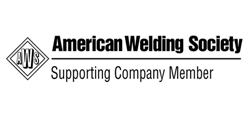Welding Technology
A Seamless, In-Demand CareerWelding Technology
A Seamless, In-Demand CareerWelding Technology
A Seamless, In-Demand Career
Program Details
The Welding Technology program prepares students for entry-level employment in the metal and construction trades. Every ship, jet, train, bridge and steel-frame building is only as strong as its welds! Today, welders use automated as well as manual methods of joining metal parts through a process of heating the metal pieces and then melting and fusing them together to form a permanent bond. Frequently, they plan their work based upon drawings and speculation figures. The modern welder is knowledgeable about workplace safety, metallurgy, blueprint reading, power sources, layout and fitting techniques, as well as tools and materials. Welders may find employment in places such as manufacturing and repair shops, shipbuilding yards, the aerospace industry, construction of buildings, bridges and other structures; also joining pipes for pipelines, power plants, refineries and the high tech sector using CNC controlled equipment. Graduates of SVC’s program will be qualified to work as entry-level welders, fitters, burners, layout persons or metal fabricators. Welders can advance to more skilled jobs with additional training and experience. Opportunities exist to become supervisors, inspectors, and instructors. Students study a variety of layout, fabrication, and metal joining techniques using steel, stainless steel, and aluminum. Processes include oxy-fuel cutting, shielded metal arc welding, gas metal arc welding, flux cored arc welding, and gas tungsten arc welding. The Welding Program stays current with industry needs through an active Advisory Committee made up of representatives from local businesses that regularly seek our graduates for employment. To learn more about Career Pathway opportunities available in Welding.
Students may enter at any quarter. Depending on the degree or certificate specialty, program completion time averages four to seven quarters. Because the program is performance-based, students may complete the program in a shorter or longer time period, depending on their individual progress. Experienced welders may upgrade their skills through special coursework.
Program Options
The Welding Program offers a wide variety of classes to meet the needs of students whose goals range from those seeking employment in the Metal Trades Industry to the home hobbyist. Classes are offered both days and evenings. Students may choose to take individual skills enhancing classes, select from several specialized Micro-Certificates, short Program Certificates, or a 2-year ATA Degree.
The estimated program length is based on full-time enrollment. It is the student’s responsibility to discuss sequencing and work out their individual schedule with a counselor or program advisor. Any developmental coursework a student may be required to complete may increase the program length. The certificate program is not intended for university transfer.
NOTE: at Skagit Valley College Micro-certificates of Completion are designed for taking courses over a short period of time focusing on enhancement or development of a specific skill or set of skills. Micro-certificate courses can help enhance employability skills or provide preparation for continuing education in the program area. Students must maintain a 2.0 GPA or above in all required coursework.
Certification
SVC’s Welding program is an approved participant in the American Welding Society Entry-Level Welder Training Program. Students who complete coursework requirements and pass written and performance exams will earn a certificate from the AWS (nominal fee required).
SVC is also an approved test lab for the Washington Association of Building Officials (WABO) welder certification program. Students completing certification or degree programs will have the opportunity to earn this important industry credential (a nominal fee is required). Special coursework is available to prepare experienced welders for this test. Students will gain experience and competence in all major welding theory, processes, and certification test procedures.
Entry into the Program
Please apply to the Admissions Office. Welding is a precision craft that demands good eyesight, hand-eye coordination, manual dexterity, the ability to concentrate on detail work for long periods, and at times, work in awkward positions. These are all important traits for a person considering this career. The ability to read English at the 8th-grade level is highly recommended. Advanced standing may be requested. For more information, contact the Department Chair or the Admissions Office.
You May Study
- Metal Fabrication
- Gas Metal Arc Welding
- Gas Tungsten Arc Welding
- Shielded Metal Arc Welding
- Flux-Cored Arc Welding
- Aluminum & Steel Welding
- Layout & Fitting
- Welding for Diesel & Automotive
- Welding Metallurgy
- Part Preparation
Why Skagit Valley College?
- Certified by the American Welding Society Entry-Level Welder Training program
- Approved test lab for the Washington Association of Building Officials
- Highly qualified faculty with many years of welding experience
- Large metal fabrication area & individual welding practice booths
- Strong ties to local shipbuilding, construction, refinery maintenance, and metal fabrication industries
- Excellent rates of job placement for graduate
Career Opportunities and Job Search Information
The Occupational Information Network (O*NET) is the nation’s primary source of occupational information. The O*Net Online database is an interactive research tool for exploring and searching occupations. The database, developed by the US Department of Labor, contains information on hundreds of standardized and occupation-specific descriptors and provides a variety of FREE Career Exploration Tools.
O-Net Online
- SOC – 51-4121.06 – Welders, Cutters, Welder Fitters
- SOC – 51-4121.07 – Solderers and Brazers
- SOC – 51-2041.00 – Structural Metal Fabricators & Fitters
- SOC – 47-2211.00 – Sheet Metal Workers
- SOC – 47-2221.00 – Structural Iron and Steel Workers
Job opportunities in this profession are expected to be excellent. In the Northwest Workforce Development Area, which includes Whatcom, Skagit and Island counties, welding-related occupations are listed as “in demand.” About 65 percent of all welding jobs are found in manufacturing. Jobs were concentrated in fabricated metal product manufacturing, transportation equipment manufacturing, machinery manufacturing, architectural and structural metals manufacturing, and construction. Good job opportunities are expected for skilled welders because some employers are reporting difficulty finding qualified workers. The employment outlook for welders in manufacturing is stronger than that for other occupations in this industry because of the importance and versatility of welding as a manufacturing process. The basic skills of welding are the same across industries, so welders can easily shift from one industry to another, depending on where they are needed most. Job prospects for welders will vary with the welder’s skill level. Prospects should be good for welders trained in the latest technologies.
For more detailed information about welding employment trends, wage rates, employment opportunities, job tasks, etc. search the websites listed below:
U.S. Bureau of Labor Statistics
WorkForce Explorer
America’s Career InfoNet – Career One Stop



